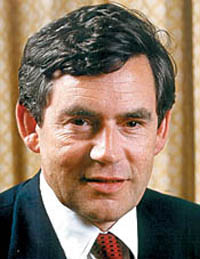Tony Blair keeps friendly terms with his expected successor
Tony Blair's expected successor said in an interview broadcast Thursday that he and the British premier were still friends despite months of bitter infighting in their governing Labour Party.

Looking calm and confident, Treasury chief Gordon Brown told Sky News television that his long-standing alliance with Blair was "one of the strongest political relationships in history" despite its ups and downs.
Brown has denied suggestions that he was behind the party rebellion that forced Blair last week to announce he would leave office within a year. Blair has said he accepts that assurance, despite reports that both men had shouting fights the day before the announcement.
Asked if he and Blair were still friends, Brown replied: "Yes, and he will always be my friend. And you build friendships, but friendships have ups and downs as well."
"I think Tony Blair has led the country with a tremendous amount of ability, skill, acumen and sensitivity to what the British people want to see done," he said.
Blair and Brown have sought to stem damaging party infighting by presenting a unified front since Blair gave in to the Labour rebels. Brown could suffer a backlash that stops him from becoming prime minister if party stalwarts think he tried to push Blair out of office.
Brown and his family are moving into the apartment above Blair's 10 Downing St. office even though he has yet to get the prime minister's job, his office said this week.
The Blairs live in the larger apartment above Brown's 11 Downing St. office. Brown has long had the use of the No. 10 flat but has until now lived in a private apartment nearby. His office said this week he had decided to move in with his growing family on the advice of police. His wife gave birth to their second baby this summer.
Traditionally the prime minister lives above No. 10 and the Treasury chief above No. 11, but Blair and Brown decided to swap when Labour took power in 1997 because Blair's larger family wanted the bigger flat, which Brown did not need.
Separately, in a further blow from a Labour dissident, a former Cabinet secretary who quit to protest the Iraq war said Thursday she was leaving her job as a lawmaker to campaign for a divided Parliament that would force Britain to overhaul its political system.
Clare Short, who served as Blair's international development secretary for six years, wrote a scathing attack on him in The Independent newspaper, harshly criticizing his support for U.S. foreign policy and saying she didn't think Brown would be any better as prime minister.
She said the best way to fix British politics would be if voters gave no party an overall majority in Parliament in elections expected in 2009, a situation she said would force a reform of the electoral system, the AP reports.
"I am standing down so that I can speak the truth and support the changes that are needed," she wrote. "Sad to say, it is now almost impossible to do this as a Labour (lawmaker)."
Subscribe to Pravda.Ru Telegram channel, Facebook, RSS!




